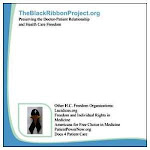
Autonomy--one of the pillars of individual rights--is also a central principle of biomedical ethics and an essential ingredient of the doctor-patient relationship. Doctor and patient form a partnership of autonomous individuals--united in the goal of promoting the patient's health.
Autonomy includes the freedom to choose who your doctor is, and how you will pay for the doctor's services. The new health care control law (PPACA) severely reduces our autonomy by restricting the choice of payment methods to those pre-approved by government.
Efforts are on-going in multiple states to preserve freedom of choice in health care by resisting the federal mandate to purchase health insurance. In addition to a number of Health Care Freedom Initiatives (both legislative and ballot initiative,) many state attorneys general have filed lawsuits questioning the mandate's constitutionality.
Colorado has an interesting approach, which you can learn about through the links provided by Dr. Paul Hsieh at Freedom and Individual Rights in Medicine. Although federal law trumps state laws, states are not without power against the federal government. Read more here, and here, and here.
Good medicine is not simply a set of pre-defined protocols. Decisions must ultimately be made according to each individual's unique circumstances and values. Doctors must be free to advise patients of the full range of options--and patients must be free to choose.
UPDATE 8-21-10: as of May, 2010, 20 states had filed suit.






good article. would like you to designate an article about "collective" health, individual medical choice and the FDA. Specifically what alternatives to the FDA can exist
ReplyDeleteMuch thanks to you for giving such significant data, and a debt of gratitude is for sharing this Business Promotion system.
ReplyDelete